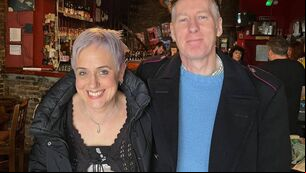Cork town’s effort to ‘waste not want not’
Students from Clonakilty Community College with a 'Stop the Sachets' poster.

Change in this sector still may come, but as Allison says: “It’s one of those big ships that turns slowly. We can only achieve so much with those guys in a year, and if we had put all our focus on them, we wouldn’t have achieved anything elsewhere. I think the repercussions of this project will grow slowly with this sector because there is really good intention there.”

Coming in at 15c per item, getting rid of sachets makes financial sense – especially at a time when margins on a food business are wafer-thin and every cent saved counts. Business owners like James, along with others in the town, have transitioned to reusable or compostable ramekins and portioning out the condiments to ensure no waste and no litter.

“The report we produce, in of data, is qualitative rather than quantitative. There’s already hard data that has been produced on a national and EU level on food waste, that’s the data we’re basing the whole project on, so the information we will compile into the report will be from the experience of the local community working with us on the project: impact statements, personal experience, case studies and analysis on how it all worked.”







 App?
App?


